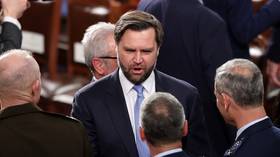Surveillance of AP on behalf of national security the 'last refuge of scoundrels'
Justification of far-reaching surveillance on the Associated Press is evidently based on interests of national security, the “last refuge of scoundrels” looking to suppress information, Norman Solomon, of the media watch group ‘FAIR’, told RT.
RT:If indeed in the interest of national security
surely the action against the Associated Press was justified in
this instance?
Norman Solomon: Well, a lot is done in the name of national
security and protecting the public. Several decades ago spying by
the Nixon administration on the press - dirty tricks and so forth -
were also rationalized within the White House and later publicly as
somehow protecting the public from subversive or other elements
that threaten the republic. And that is, really, one of the last
refuges of scoundrels, when it comes to top leaders who want to
turn off the tap of information reaching their own public. That
those leaders would rather the public be kept in the dark.
And I think what we’ve seen with these revelations about the phone
records of AP reporters is that this administration, which has
already waged a larger war against more whistleblowers than any
other in US history, has continued to push the envelope and tried
to have a chilling event not only on journalists but to sources
within the administration.
RT:And targeting obviously a credible organization like
the Associated Press, in some ways has it been a victory for
journalists because it’s been a major embarrassment now for the
Obama administration?
NS: Well, I think it cuts both ways, because while the Obama
administration in the last couple of days has encountered fierce
criticism from very mainstream and even some conservative media
outlets, the administration has also sent a very clear message to
every employee of the US government. “You may think that you’re on
your cellphone or your home telephone speaking to a journalist
telling them something that perhaps we at the White House don’t
want you to tell, but now you’re on clearer notice than ever that
down the road your phone number may turn up in subpoenaed documents
by the Department of Justice or some other agency, and then we can
turn the screws on you and find out whether you’re a
whistleblower.” That’s a very dangerous message, and in that sense
this is a blow for freedom of the press, against freedom of the
press.
RT:But aren’t there rules though? If it is classified
information that person is leaking to the press, then of course the
White House would be saying that sort of information could
compromise national security, then they’re in the wrong and they do
deserve to be tracked down?
NS: Well, that’s always the argument, but it turns out that
there’s so much classification of information that the US public,
not only has a right to know, but must know for democracy to
function. And to be kept in the dark, to not know what is being
done in our names, with our own tax dollars, by our elected leaders
is to short-circuit our own capacity to be part of a democratic
process.
RT:So a fine balance, then, between the need for
national security and for respecting freedom of speech and privacy
rights. It’s going to be a long argument this one, isn’t it? And do
you think there ever will be a balance found?
NS: Well, the balance will be fought over, but until the US
ends the perpetual war footing, this so-called War on Terror, then
the domestic repression is going to be a major problem.
The statements, views and opinions expressed in this column are solely those of the author and do not necessarily represent those of RT.












